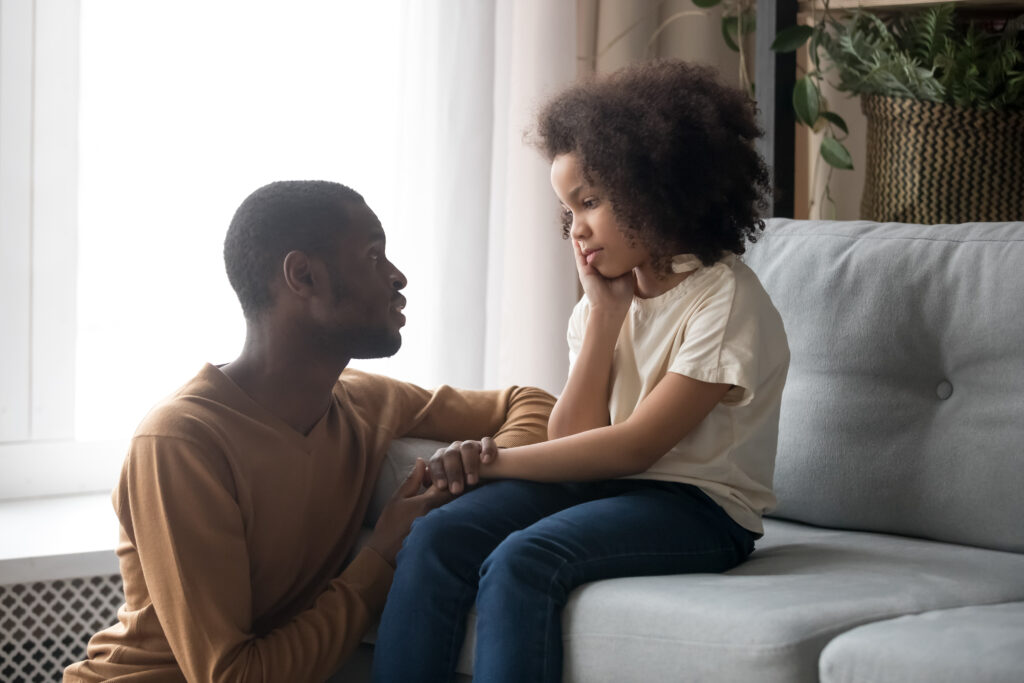Whenever there’s a high-profile trauma, whether it’s an act of terrorism or a destructive hurricane, it’s important to remember that kids may be experiencing increased levels of stress or anxiety.
Even if they’re not personally affected, exposure to tragic events through the media or overheard conversations can affect a child’s emotional well-being. In light of recent events, we’re re-sharing this list of things to keep in mind when helping children cope with tragedy.
Be understanding.

Not everyone reacts the same way in times of crisis. Some children may become more quiet or withdrawn, while others may become irritable or act out. These are all normal reactions, and adults need to respond in a calm and caring way. The National Child Traumatic Stress Network says how children experience traumatic events and show their distress will depend largely on their age and level of development.
Take time to connect.
Sometimes adults can become preoccupied with disturbing events and managing their own responses. They can forget that children are aware of what’s happening. Take a moment to check in with your child and let them know they can talk to you and ask questions.
Limit their exposure.
As our friends at Children’s Hospital of Orange County have noted, parents should consider the proximity of an event and what information a child truly needs to know. Be aware of potential social media exposure or televisions that are on and broadcasting news coverage in common areas. Talk about the child’s feelings and concerns, provide reassurance, and offer age-appropriate information — more on that in a moment — to help clarify misunderstandings and reduce fear. We can also teach children to use their own coping skills, such as talking to a trusted adult or doing activities like playing with friends, reading, praying, singing, dancing or creating art.
Promote self-care.
In time of crisis, many of us become the caretakers of those who are most affected. These selfless acts of kindness are appreciated, but adults must also remember to take care of themselves. Promoting self-care will ensure you don’t burn out or experience higher levels of compassion fatigue, allowing you to care for others for a longer period of time with greater efficiency.
Show patience.
Just as individuals may have varying responses in times of tragedy, they will also have different timeframes for healing. Try your best to be patient with those you’re caring for, as they may have a shorter or longer response time to the crisis.
Make sure to follow up.
Check in periodically to make sure children are continuing to cope in healthy ways. If additional support is needed, reach out to a school counselor or clinician. The majority of schools have counselors who can meet with students to check in, help them process what they are experiencing and teach them about healthy coping strategies. If you would prefer seeking services outside of school, most medical insurances offer coverage. You can also use the OC Navigator website to find health and wellness resources, some of which are free or offered at a low cost.
Keep explanations appropriate.
Meanwhile, the National Association of School Psychologists offers these suggestions for keeping explanations of school-based violence developmentally appropriate:
- Early elementary school students need brief, simple information that is balanced with reassurances that their schools and homes are safe and that adults are there to protect them. Give simple examples of school safety that remind children about exterior doors being locked, child monitoring efforts on the playground, and emergency drills being practiced so they are prepared if somethings happens.
- Upper elementary and early middle school students will be more vocal in asking questions about whether they truly are safe and what is being done at their school. They may need assistance separating reality from fantasy. Discuss the efforts of school and community leaders to establish safe campuses and provide concrete examples.
- Upper middle school and high school students will have strong and varying opinions about the causes of violence in schools and society. They will share concrete suggestions about how to make school safer and how to prevent tragedies in society. Emphasize the role that students have in maintaining safe schools by following school safety guidelines — for example, not providing building access to strangers, reporting strangers on campus, and reporting threats made by students or community members — communicating any personal safety concerns to school administrators, and accessing support for emotional needs.
Look for the helpers.
Finally, we’ll close with a perspective you might have heard or seen shared online. It comes courtesy of the late Mister Rogers, the beloved children’s television host.
“When I was a boy and I would see scary things in the news, my mother would say to me, ‘Look for the helpers. You will always find people who are helping.’ To this day, especially in times of disaster, I remember my mother’s words, and I am always comforted by realizing that there are still so many helpers — so many caring people in this world.” — Fred Rogers
For more on how to talk to children about incidents of mass violence, check out this blog post from CHOC.
